Why Georgian students do not want to return to classrooms
Students in Georgia demand to return to hybrid learning
After two years of distance learning, many higher education institutions in Georgia have resumed their education in a hybrid mode – that is, students can choose to continue their studies online or in the classroom. The exception was the country’s main state university, Tbilisi State University (TSU), which completely switched back to classroom learning on May 2.
For young people who have only seen each other through computer screens for two years, the resumption of classroom learning should, in theory, should be good news. However, this was not the case for everyone – some students protest against the decision of the TSU leadership and demand a hybrid or blended form of education.
During the pandemic, since the training went online, a large number of students from the regions of Georgia returned to back to their homes. About 22,000 students study at TSU, and a significant part of them are residents of the country’s regions. They say that it will now be difficult to return to Tbilisi and rent an apartment in such haste. Moreover, after the war in Ukraine, due to the large influx of citizens of Russia and Belarus, apartment rentals in Tbilisi have risen in price significantly.
Anna Turmanidze, 20, is a second-year student at the Faculty of Economics and Business, although she has never been to a lecture in the classroom.
Being a student was her dream, which was partly taken away by the pandemic. Now that lessons have resumed in classrooms, Anna’s financial situation has become more difficult – renting an apartment in Tbilisi is now very expensive.
If the university does not change its mind and does not reintroduce a hybrid regime of learning, the only solution for Anna will be to skip lectures, study material on her own, and only come to Tbilisi for exams.
- Silent no more: young Azerbaijanis dare to speak out in Georgia
- Is Georgian language banned in Abkhaz schools?
- ‘Not enemies’ – how Georgia welcomes emigrants from Russia and Belarus
“If it works out, even then I will have to stay with a distant relative. It is very difficult to become a burden for a person for two months – and there are many students who have no relatives in Tbilisi”.
Anna imagined her student life differently, but the pandemic turned everything upside down:
“If we demand a hybrid mode, this does not mean that we do not want to come to the classes. For me personally, the university is still something of a curiosity, I have a great desire to come and experience student life – to get to know classmates and communicate with teachers face to face.
Tbilisi State University resumed classroom learning on May 2. The reason was the need for the improvement of the quality of education.
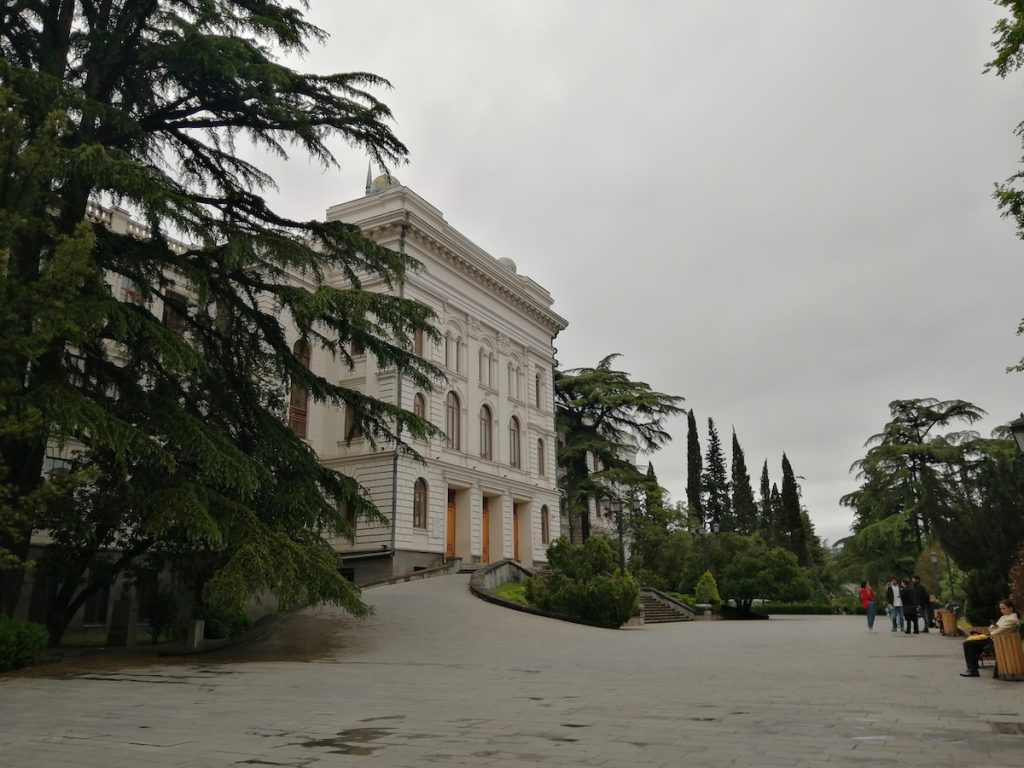
TSU’s public relations department told JAMnews that students were given two months’ notice.
Currently, TSU is the only state university with no hybrid education.
Anna Turmanidze says that even if she finds an apartment at an affordable price, she has two months left before the end of the semester and will have to return to Batumi for the holidays. Landlords rent apartments for at least six months, which means she will have to pay an additional four months for renting an apartment in which she will not live.
The university offers dormitories to students – on the outskirts of Tbilisi in the Lisi or Bagebi districts. TSU reports that the dormitory in Lisi is designed for 320 students, and Bagebi can accommodate 396 students. According to them, they have several dozen empty rooms. We asked Anna why she didn’t want to move there.
“The university also asked why we do not move in to dormitories when there are free places. But have you seen them?”, Anna asks.
“I live here, every week something burns”
The Bagebi dormitory consists of two high-rise buildings built back in the Soviet era. Some walls have large cracks through which the courtyard is visible. In many places, the plaster has fallen off and the old parquet is mostly destroyed. Bare wires run along the walls, black spots are visible in several places – these are traces of short circuits, which jeopardize the safety of people living there.
The bathroom and toilet are shared here, but there is no kitchen at all. Some students try to cook in the room, others cook on the balcony.
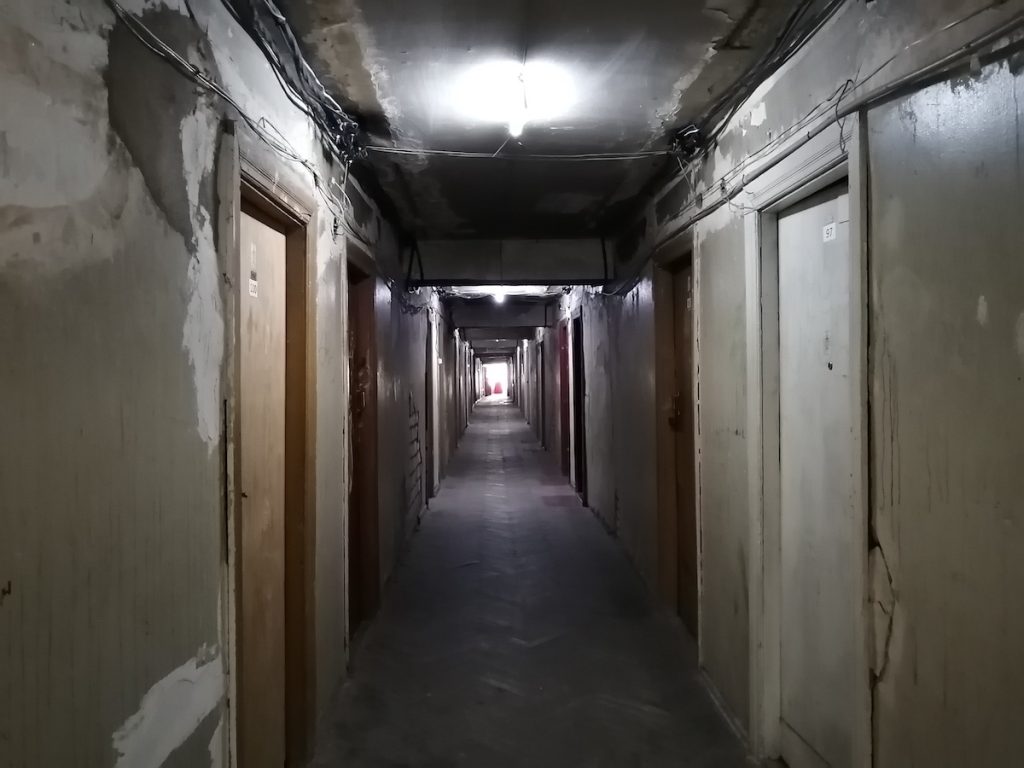
TSU also admits that the Bagebi dormitory is not an ideal place for students to live.
As we were told at the university, both buildings of the dormitory were inspected by experts from the Samkharauli State Bureau, who came to the conclusion that these buildings “need serious repairs”. However, repairs will be so expensive that it is easier to build new buildings.
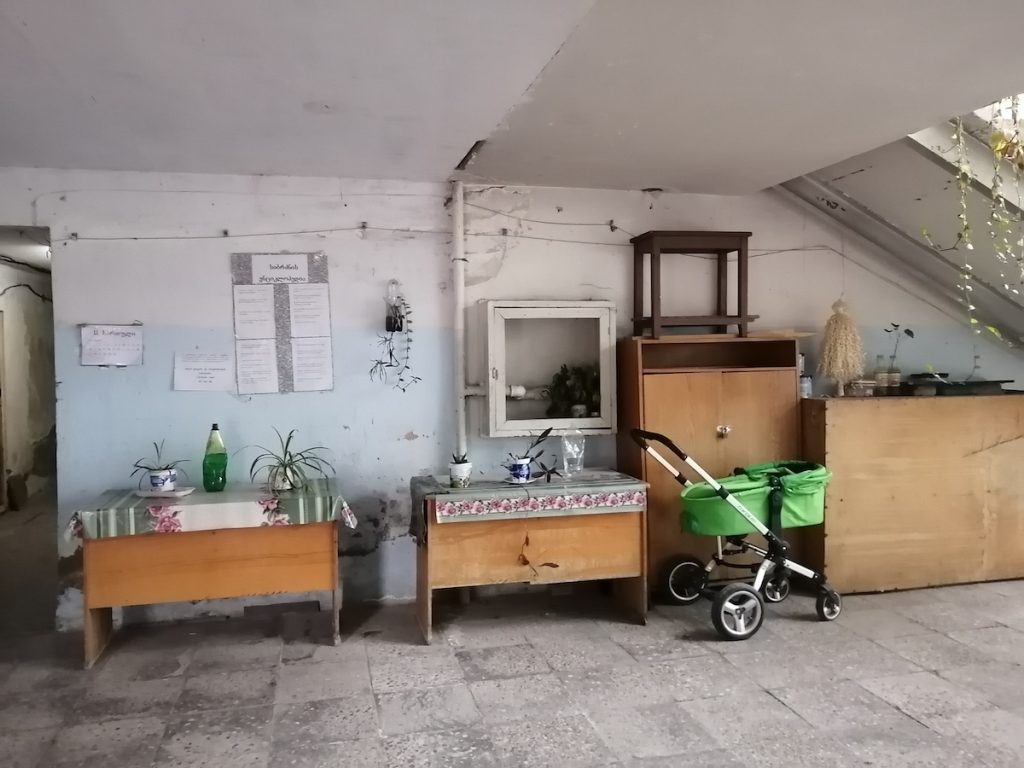
The university notes that the buildings have not been on their balance sheet for many years and this created “significant difficulties” in carrying out restoration and repair work. According to representatives of the university, work is underway to begin the construction of a new dormitory.
19-year-old Mariam Gulua has lived in Bagebi for about a year and pays 50 lari [about $17] per month. She had rented an apartment several times before, but because the mode of learning changed several times during the pandemic, she ended up having problems with the owners of the apartments and had to return home to one of the villages in Western Georgia. She eventually moved into a dormitory. She says that there were no photos on the site and she expected that it was the same as in the buildings in Lisi.
“For as long as I’ve lived here, every week something burns. A few days ago, my lamp exploded, and then my charger melted, and I couldn’t attend exams until a neighbor lent me a computer”.
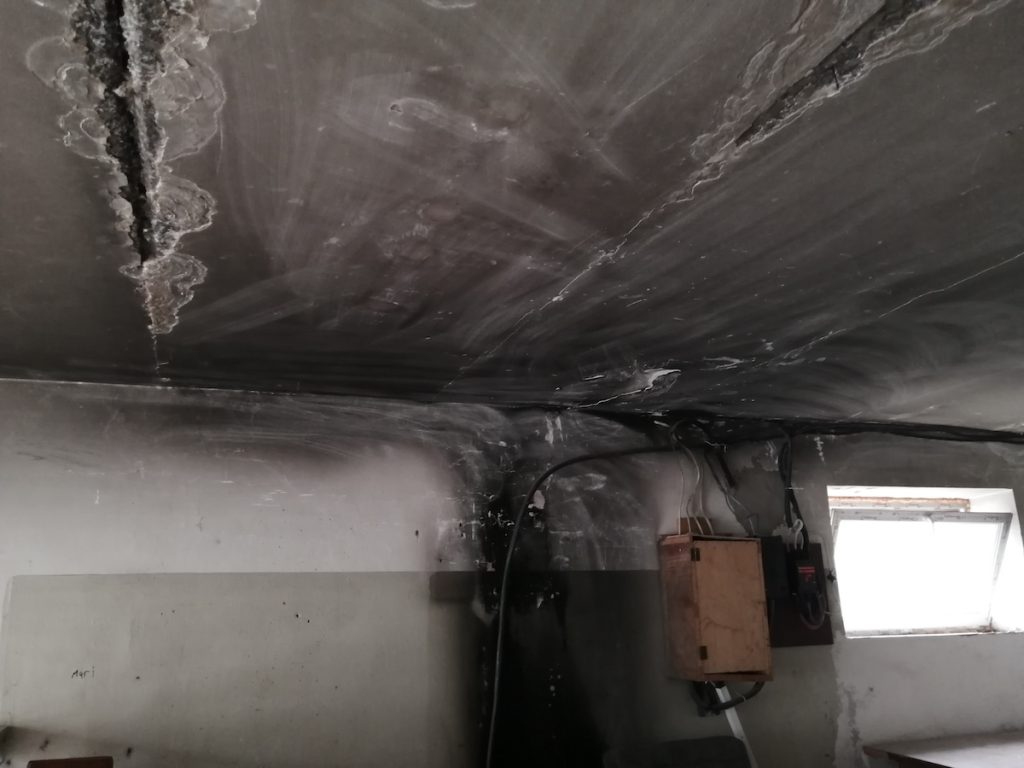
Now Mariam is actively participating in student rallies, demanding TSU’s leadership introduce a hybrid mode of education.
Mariam says it’s almost impossible for an 18-19-year-old student, often dependent on their parents, to pay higher rent for an apartment. Added to this are meals, tuition fees, and other expenses. Mariam asks the university to take into account the needs of students.
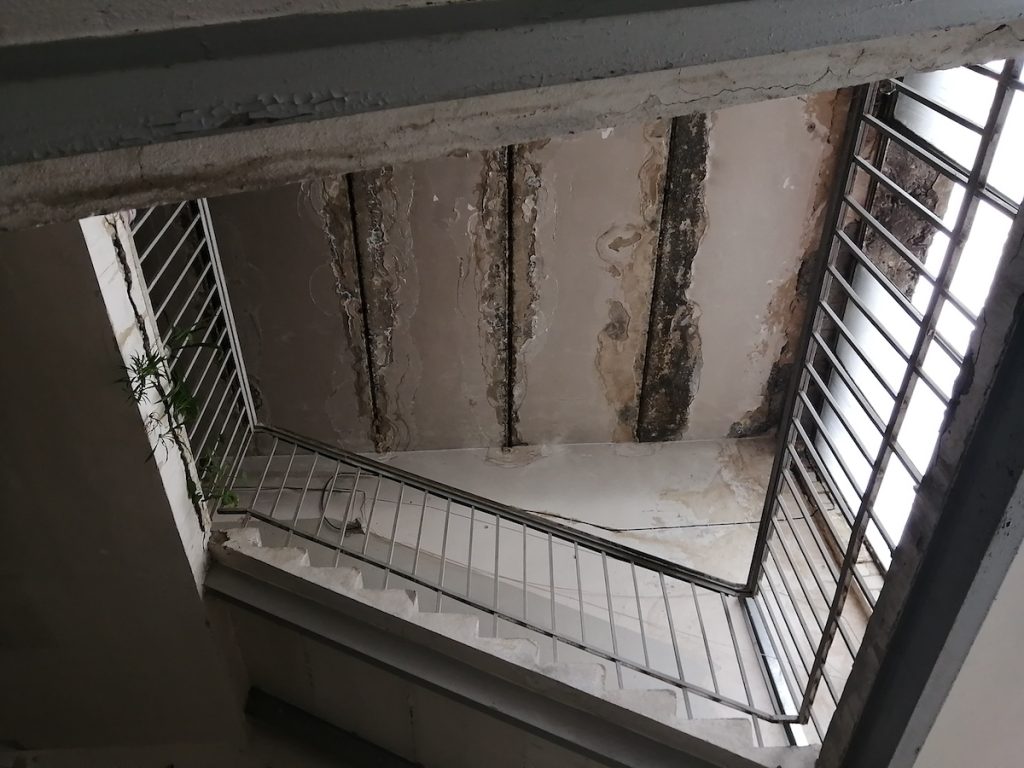
“University means students – not the administration, not photographs of Javakhishvili (the founder of the university) or the facade of the building. The main university of the country, that claims to be student-friendly, must take into account their needs and requirements”.
Student dormitory that meets European standards
TSU management believes that other student dorms, which was built on Lisi, meet European standards.
Conditions in the Lisi dorms are much better than in Bagebi.
There is a bathroom and a toilet in each room, a shared kitchen, and a laundry room. Student Sophie Malashkhia says that every day a cleaner comes and cleans common areas, although mice have been seen several times, once in one of the student rooms.
During the interview, we kept smelling food, and Sophie told us that even though the kitchen had an extractor fan it did not work, so this was a common occurance. Due to a damaged window lock, wind noise is often heard in the room.
Sophie from Zugdidi, a fourth-year student at the Faculty of Humanities, has been living in a Lisi dormitory for a year now. She pays 150 GEL [about $50] a month. She says that before she rented an apartment for three years and could not find housing for 150 GEL.
“However, I think that TSU’s statement that it meets European standards is somewhat exaggerated. For example, they say that there is a library here. I’ve lived here for a year now and have never seen it. There must be a dining room, I know there is a room, but I have never seen it open”.
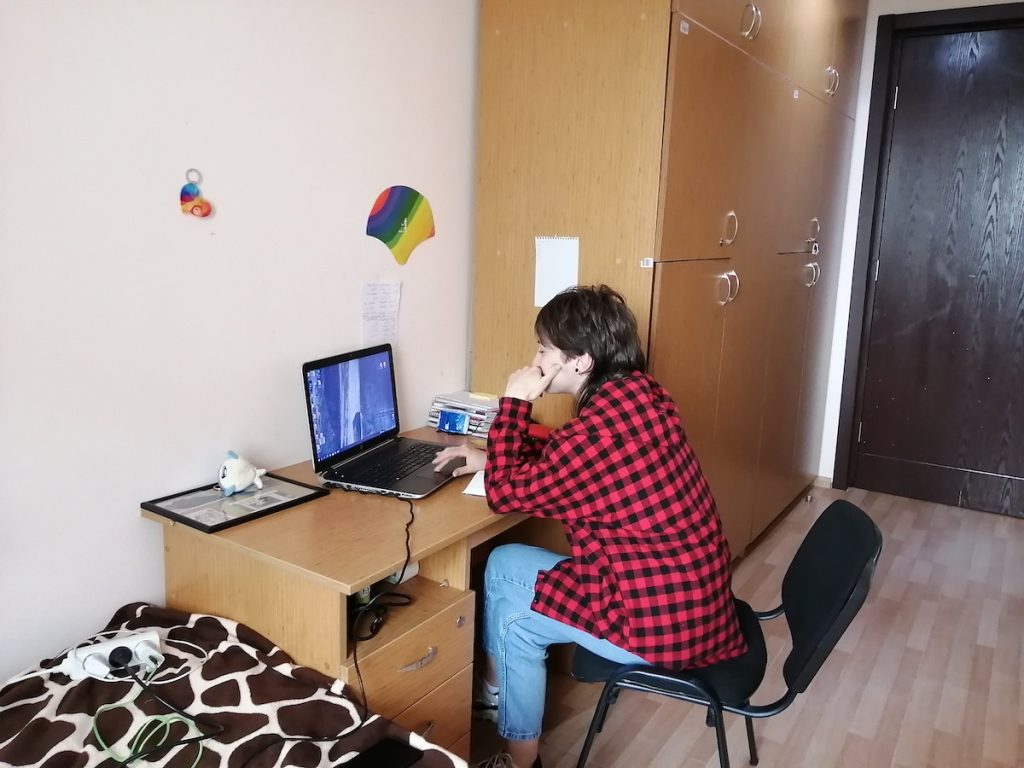
Sophie says that some old furniture was brought into the third building of the dorms, which has been closed since 2017, and some students are supposedly going to move in. We found that most of the rooms there are locked, although we managed to look into one of them. Sophie showed us photos.
“Recently, cases have become more frequent when a landlord evicts tenants from an already rented apartment because more solvent clients have appeared. In addition, during these two years, some of the students found work in their home cities during distance learning. In the middle of the semester, this change disturbs many people”.
Sophie tells us that some faculty members are willing to do additional online lectures for students who can’t attend classroom lectures, though they’re not sure the university would authorise it.
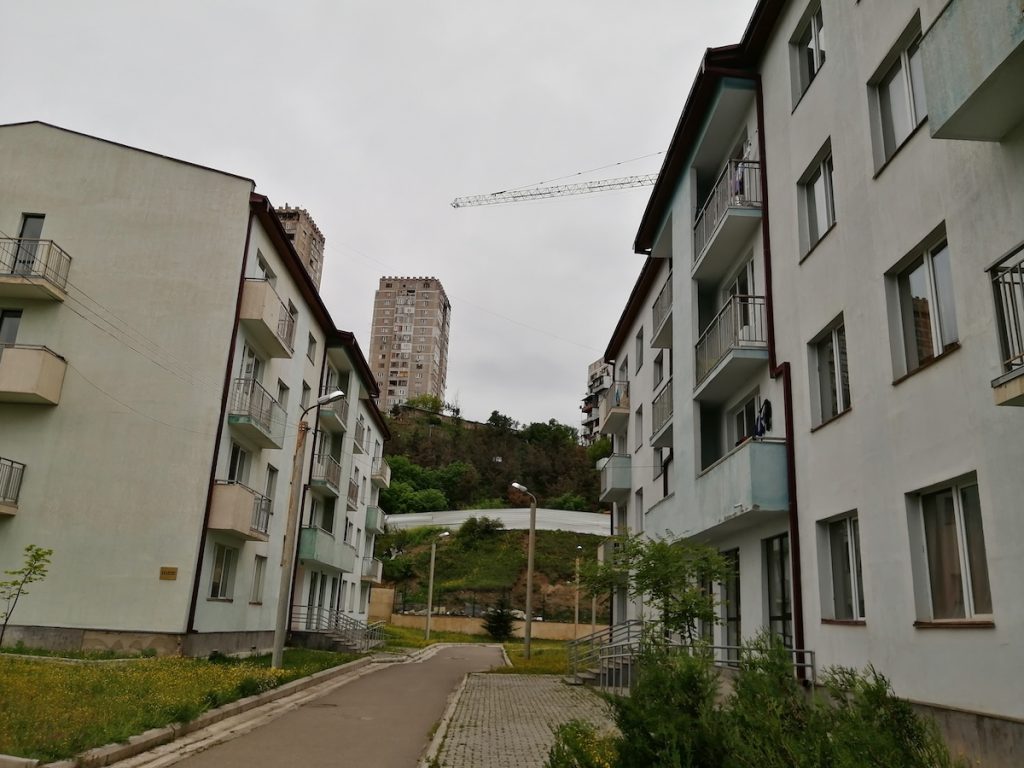
Tbilisi State University said that it has already announced an auction for the construction of a dormitory and supporting infrastructure for 3,000 students on its plot of land.
“The construction of the campus was planned much earlier, but its implementation was prevented by the pandemic”, the university said.
Sophomore student Ani Nodia does not yet know how she will live in such conditions.
She attended lectures from her home in Poti. She is still looking for an apartment in Tbilisi, but says that apartments equipped with the necessary furniture and appliances are so expensive that she cannot pay for it alone and hopes that she can rent them with another student.
“I may be able to rent an apartment, but I will live in an unsuitable environment for studying and will have double expenses. If I can’t, I will have to study on my own with the materials published on the university website and listen to lecturers who will meet halfway and post their lectures online, and then I will have to travel to take the exams”.
What the university says
TSU reports that in-person training resumed on May 2, and class attendance is quite high.
The TSU Public Relations Department also reported that those students who cannot attend the educational process for social or other reasons will be provided with “individual assistance”.
“Their teachers will provide study materials through various communication channels, provide advice so that they can successfully complete the spring semester”.
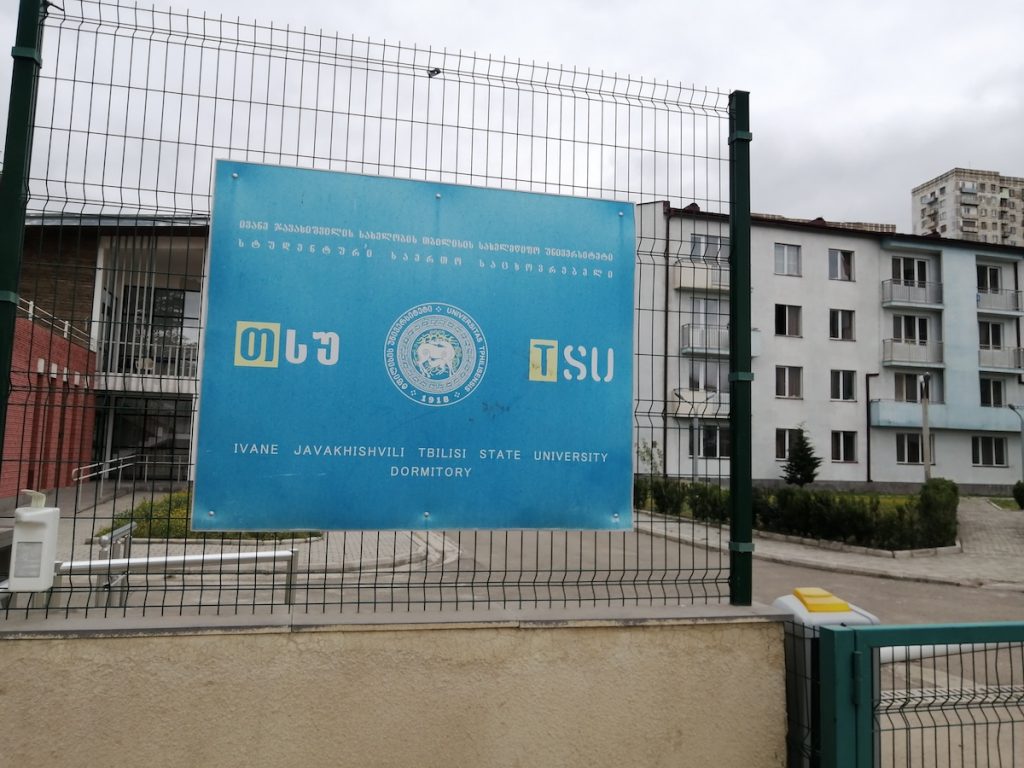
Keti Bakhtadze, one of the organizers of the student rally, believes that the TSU decision violates the constitutionally guaranteed right to education. She talks about the problem of communication with students and gives us an example of the fact that the university shared the decision to continue studying in the classroom on Facebook.
“University doesn’t know its students, their social status or needs, doesn’t communicate with them”
Keti Bakhtadze says there are more than 800 students demanding the hybrid learning mode, but the university is not making concessions. She says the university does not want a student protest to be effective.
“Then it will lead to the strengthening of the student movement, which, of course, is not in the interests of the current leaders. It’s very sad what the university has become in recent years”.
Any university decision should be based on the principle of access to education and the interests of students, says education expert Shalva Tabatadze.
“If access to education is in question even for a small number of students, the university should focus on those students”.
According to him, TSU representatives, instead of talking about what led to the decision and why they are not preparing for a hybrid regime, focused on how much more useful face-to-face classes are.
“No one disputes this at the university either. The problem is why it did not make a decision that would not create problems with access to education”.
Shalva Tabatadze notes that TSU has a rather large budget and, with proper management, it would be possible to conduct hybrid training. One example of mismanagement is the issue of access to the Zoom platform for visiting professors.
“Professors either paid with their own money for it or found other mechanisms for conducting lectures. The TSU budget actually allowed for this, and the students’ assertion that university funds were not being spent on their behalf in the context of both the Zoom platform and the hybrid mode was correct, so there should be no problems with access”.
The Ministry of Education issued a special statement after several actions were held at TSU, and some students even spent the night in the building.
The department called on the university administration to take into account the situation of students as much as possible – to provide them with free places in the student dormitory and provide them with an opportunity to end the 2021-2022 academic year in a hybrid mode. (In Georgia, universities make specific decisions about the educational process autonomously).
The rector met with the students on May 11, but it is not yet known whether the decision of the university will change.


















